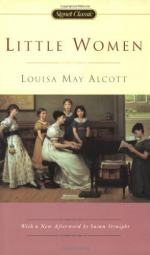No gentleman were admitted, so Jo played male parts to her heart’s content and took immense satisfaction in a pair of russet leather boots given her by a friend, who knew a lady who knew an actor. These boots, an old foil, and a slashed doublet once used by an artist for some picture, were Jo’s chief treasures and appeared on all occasions. The smallness of the company made it necessary for the two principal actors to take several parts apiece, and they certainly deserved some credit for the hard work they did in learning three or four different parts, whisking in and out of various costumes, and managing the stage besides. It was excellent drill for their memories, a harmless amusement, and employed many hours which otherwise would have been idle, lonely, or spent in less profitable society.
On christmas night, a dozen girls piled onto the bed which was the dress circle, and sat before the blue and yellow chintz curtains in a most flattering state of expectancy. There was a good deal of rustling and whispering behind the curtain, a trifle of lamp smoke, and an occasional giggle from Amy, who was apt to get hysterical in the excitement of the moment. Presently a bell sounded, the curtains flew apart, and the operatic tragedy began.
“A gloomy wood,” according to the one playbill, was represented by a few shrubs in pots, green baize on the floor, and a cave in the distance. This cave was made with a clothes horse for a roof, bureaus for walls, and in it was a small furnace in full blast, with a black pot on it and an old witch bending over it. The stage was dark and the glow of the furnace had a fine effect, especially as real steam issued from the kettle when the witch took off the cover. A moment was allowed for the first thrill to subside, then Hugo, the villain, stalked in with a clanking sword at his side, a slouching hat, black beard, mysterious cloak, and the boots. After pacing to and fro in much agitation, he struck his forehead, and burst out in a wild strain, singing of his hatred for Roderigo, his love for Zara, and his pleasing resolution to kill the one and win the other. The gruff tones of Hugo’s voice, with an occasional shout when his feelings overcame him, were very impressive, and the audience applauded the moment he paused for breath. Bowing with the air of one accustomed to public praise, he stole to the cavern and ordered Hagar to come forth with a commanding, “What ho, minion! I need thee!”
Out came Meg, with gray horsehair hanging about her face, a red and black robe, a staff, and cabalistic signs upon her cloak. Hugo demanded a potion to make Zara adore him, and one to destroy Roderigo. Hagar, in a fine dramatic melody, promised both, and proceeded to call up the spirit who would bring the love philter.
Hither, hither, from thy home,
Airy sprite, I bid thee come!
Born of roses, fed on dew,
Charms and potions canst thou
brew?
Bring me here, with elfin
speed,
The fragrant philter which
I need.
Make it sweet and swift and
strong,
Spirit, answer now my song!




